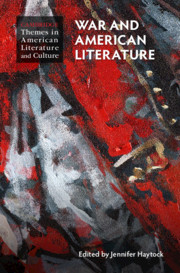Book contents
- War and American Literature
- Cambridge Themes in American Literature and Culture
- War and American Literature
- Copyright page
- Contents
- Contributors
- Acknowledgments
- Chronology
- Introduction
- Part I Aspects of War in American Literature
- Part II Cultural Moments and the American Literary Imagination
- Part III New Lines of Inquiry
- Chapter 18 War and Queerness
- Chapter 19 War and Disability Studies
- Chapter 20 War and Ecocriticism
- Chapter 21 War and Whiteness
- Chapter 22 War and Posthumanism
- Further Reading
- Index
Chapter 18 - War and Queerness
from Part III - New Lines of Inquiry
Published online by Cambridge University Press: 20 January 2021
- War and American Literature
- Cambridge Themes in American Literature and Culture
- War and American Literature
- Copyright page
- Contents
- Contributors
- Acknowledgments
- Chronology
- Introduction
- Part I Aspects of War in American Literature
- Part II Cultural Moments and the American Literary Imagination
- Part III New Lines of Inquiry
- Chapter 18 War and Queerness
- Chapter 19 War and Disability Studies
- Chapter 20 War and Ecocriticism
- Chapter 21 War and Whiteness
- Chapter 22 War and Posthumanism
- Further Reading
- Index
Summary
Queer art and literature demonstrate an awareness of how a permanent war culture constitutes the nation’s social fabric, thus defining the unavoidable contingencies informing LGBTQ+ persons’ desires and subjectivities as citizen-subjects. Along with race, gender, class, sexuality, and citizenship status, war culture operates intersectionally. This essay introduces four new approaches to LGBTQ+ art and literatures’ representation of queer subjectivities’ relationship to war culture: the desire for national inclusion and queer fetishizations of the war-state (Gertrude Stein, Gore Vidal); activist-poets’ resistances to war culture as heteronormative and white supremacist (William S. Burroughs, Allen Ginsberg); the perceived “terrorism” of queer activist arts’ militancy (Rabih Alameddine, Kathy Acker); and addresses of globalized queer vulnerability after 9/11 and vis-à-vis the climate crisis (Gloria Anzaldúa, Kazim Ali, Ocean Vuong).
- Type
- Chapter
- Information
- War and American Literature , pp. 271 - 285Publisher: Cambridge University PressPrint publication year: 2021

